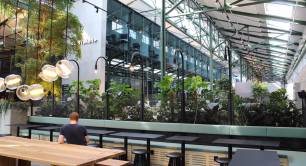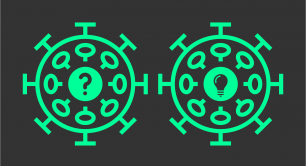40 big names join $75m global alliance to save social businesses from Covid collapse
Forty organisations have teamed up to help social businesses worldwide survive the coronavirus crisis.
The COVID Response Alliance for Social Entrepreneurs has attracted many of the world’s biggest names in social enterprise and impact investing, such as the Global Steering Group for Impact Investing, the Global Impact Investing Network, Ashoka and the Skoll Foundation.
The new tie-up, announced yesterday, will not create a separate funding pot, but members hope that uniting under a common name will help them attract more finance. This would then be split among their current portfolios which, combined, count more than 15,000 social entrepreneurs – who themselves help 1.5 billion people in more than 190 countries. In most cases the funds are expected to be provided in the form of emergency grants to help pay salaries, but could also be flexible loans.
The new alliance also hopes to help its entrepreneurs by:
- Assessing needs across investee portfolios and aligning where possible
- Coordinating non-financial assistance (eg on procurement, legal services and technology)
- Advocating for favourable tax and policy measures
Coordinated by the World Economic Forum’s Schwab Foundation for Social Entrepreneurship with funding from GHR Foundation, the alliance is made up of foundations, multilateral organisations, private companies and NGOs. Members also include Catalyst 2030, a global group working together on the UN’s Sustainable Development Goals, which will represent social entrepreneurs; and Covidcap.com, an emergency funding database developed by the Center for the Advancement of Social Entrepreneurship at Duke University.
Half of Yunus Social Business’ current investees have lost 50-100% of their income already
François Bonnici, head of the Schwab Foundation, said social entrepreneurs and their partners had been “working for years to solve market failures and demonstrate more sustainable and inclusive models”, but that they now faced “bankruptcy and severe constraints while they also innovate and respond to this global pandemic”. The new alliance, he added, was “committing support for social entrepreneurs to protect decades of work in the impact sector.”
Fundraising together
To date, alliance members have announced US$75m in total in response to the health and economic impacts of the pandemic. This includes individual commitments as well joint ones from cash raised via the alliance.
Don Gips, CEO of the Skoll Foundation – which has committed to quadrupling its grants this year – said: “We hope that this alliance will encourage others to join us in expanding support to social entrepreneurs and convincing governments of the critical leadership role that social entrepreneurs play in the response and recovery from this global pandemic.”
Saskia Bruysten, cofounder and CEO of Yunus Social Business, which helped to develop the fund, told Pioneers Post last week that initially €10m-€15m on top of what organisations had already committed would be needed to save the 5,000 social entrepreneurs supported by alliance members. (Since then, many more organisations have joined the alliance, bringing more social entrepreneurs with them, and an updated calculation has not yet been provided.)
“There’s usually quite a positive response from funders when they see different organisations working together rather than on their own”
It is hoped that approaching major donors such as government aid agencies as a broad alliance will lend their cause more weight, while potential funders will find it more efficient to issue finance through one large contract rather than considering multiple smaller bids. The donor would issue funding to one organisation within the alliance, which would then give ‘subgrants’ to its partners, according to Bruysten.
“There’s usually quite a positive response from the funder side... when they see the different organisations working together, rather than just working on their own,” she said.
Each organisation within the alliance will also draw on its own network. Yunus Social Business, a Germany-based philanthropic venture fund, recently raised €2m for its Covid-19 response from an individual anonymous donor. This funding has been split with two other alliance members and some of the money has now landed in the bank accounts of Yunus Social Business investees.
Bruysten said half of her organisation’s current investees, which are in east Africa, Latin America and India, have lost 50-100% of their income already. Less mature businesses have been hardest hit, she said: startups, “if they’re lucky”, typically have just a month’s cash to tide them over.
Yunus Social Business will be allocating emergency grants to its 30 or so investees according to the level of urgency, their access to other sources of funding, and the social impact achieved by financing that company. Cash is being provided on a month by month basis as the situation is changing so quickly.
But Bruysten said that any emergency funds raised and distributed now – while stepping in as a fast-track measure – would be “a drop in the ocean” compared to overall need. It’s hoped that government money will be available later. Lobbying governments for more social enterprise support, especially those in countries where help even for commercial SMEs is difficult to access, is a key priority of the alliance.
Asked if the collaborative approach of the alliance would continue beyond the Covid-19 emergency phase, Bruysten said she was “cautiously optimistic”, but highlighted that it had been set up for an initial 90-day period.
“This is not an alliance that’s trying to self-preserve – only if there’s really a use and a need,” she said. “That’s what we want to figure out in the next 90 days.”
The 40 alliance members are: Aavishkaar Group, Acumen, Africa Venture Philanthropy Alliance (AVPA), Aspen Network of Development Entrepreneurs (ANDE), Ashoka, Asian Venture Philanthropy Network (AVPN), B Lab, Bertelsmann Stiftung, CASE at Duke University, Catalyst 2030, Co-Impact, Draper Richards Kaplan Foundation, Echoing Green, European Venture Philanthropy Association (EVPA), Fundación Avina, GHR Foundation, Global Innovation Fund, Global Steering Group for Impact Investing (GSG), Global Impact Investing Network (GIIN), Greenwood Place, IKEA Foundation, IKEA Social Entrepreneurship, Impact Hub, Johnson & Johnson, KIVA, LatImpacto, Lex Mundi Pro Bono Foundation, Mercy Corps Ventures, Motsepe Foundation, NESsT, Nonprofit Finance Fund (NFF), Rippleworks, Root Capital, SAP, Schwab Foundation, Skoll Foundation, USAID, Yunus Social Business.
Header photo: Spouts of Water in Uganda, which provides access to safe and clean drinking water through the production and distribution of ceramic water filters. Yunus Social Business has provided the company with emergency payroll relief to help it survive Covid-19.
We're working hard to provide the most up-to-date news and resources to help social businesses and impact investors share their experiences and get through the Covid-19 crisis. But we need your support to continue. As a social enterprise ourselves, Pioneers Post relies on paid subscriptions and partnerships to sustain our purpose-led journalism – so if you think it's worth having an independent, mission-driven, specialist media platform for the impact movement, please click here to subscribe.




